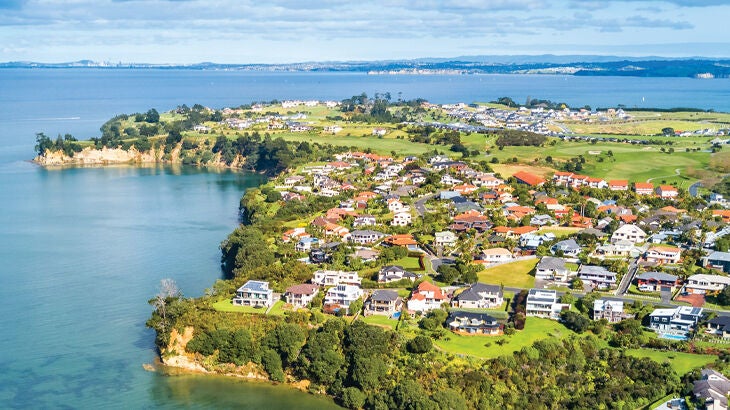View Auckland -
Ready to rebound

Residential market sentiment is bouncing back from economic uncertainty, with a built-up queue of buyers and sellers encouraged by improving housing sector dynamics.
The forces weighing heavily against the housing market over the last 18 months are starting to ease, with stubborn inflation and decade-high mortgage lending rates showing early signs of stabilisation.
The residential real estate sector has experienced a seismic shift since the pandemic days of double-digit value growth, where house prices shot up 43 percent in the year and a half to December 2021.
Since then, housing market value nationwide has fallen more than 11 percent due to a potent mix of rapidly rising interest rates, economic ambiguity and fear of overpaying in an increasingly volatile marketplace.
But, with new forces influencing demand, is the market ready to rebound?
DOWNTURN ENDING, RECOVERY NEAR?
Bayleys Auckland General Manager of Residential Raymond Mountfort says house sales have risen almost 30 percent since bottoming out in December last year, and there’s a spring in the step of buyers at Bayleys’ open homes and auction rooms.
“Prices are yet to show material movement, but recent data releases, including Real Estate Institute’s (REINZ) Housing Price Index (HPI), reflect that we have reached the end of an 18-month contraction.
“Auckland typically leads broader market trends, and monthly improvements across the region have revealed a slight increase in the seasonally adjusted median sales price, suggesting the residential market may be climbing out of its slump.
“Low levels of new listings are working with rising sale volumes - starting to track up around historically normal levels – which is shifting the pendulum back to a greater balance between supply and demand.”
Mountfort says the turning tide is owing to a combination of factors, including the Reserve Bank of New Zealand’s (RBNZ) recent pause in the Official Cash Rate (OCR).
“Policy changes, including an easing in loan-to-value ratio (LVR) restrictions and less stringent credit assessments under Credit Contracts and Consumer Finance Act (CCCFA) reforms offer further encouragement for Kiwis that the direction of the wind is changing.”
SLOWING INFLATION IS GOOD NEWS FOR INTEREST RATES
Bayleys Head of Insights, Data and Consulting Chris Farhi says July was a critical month for housing market information, given we saw Consumer Price Index (CPI) data released for the June quarter, and it was the first whole month since the RBNZ announced the end of the rate hiking cycle.
“CPI inflation for the 12 months ending June 2023 was 6.0 percent, which is the lowest level since December 2021.
“While the recent fall in inflation won’t independently have a significant impact on the property market, the downward trend will provide homeowners with confidence that interest rates – and thus mortgage lending rates – will fall, underscoring the sentiment that residential selling conditions will improve.
“An easing CPI also translates to less need for the RBNZ to raise the OCR, which is supported by recent labour market data showing unemployment rose slightly to 3.6 percent in June – tangible evidence that the economy is cooling.”
Farhi says that despite inflation easing for the third consecutive quarter, domestic readings, of which housing costs are a key contributor, remain elevated.
“Rents are the single biggest component of the CPI and, at 4.2 percent growth year-on-year, continue to rise at a meaningful pace, exacerbated by current migration trends.”
MIGRATION BOOM A BOOST TO RENTALS?
Across New Zealand, we see evidence that the migration trend has reversed, with a meaningful gain of 86,800 people in the last 12 months.
Bayleys Canterbury General Manager of Sales Rachel Dovey says a net gain of non-citizens puts pressure on housing supply by increasing the physical demand for homes.
“Policy changes have attracted new migrants from places like China, India, the Philippines and South Africa to fill critical skill shortages and ease economic capacity constraints.
“Legislation which restricts migrants’ ability to purchase residential property means these new arrivals are unlikely to buy homes immediately, but ultimately still need somewhere to live, which we’re seeing already boosting rental demand.”
Data from TradeMe shows the country’s median rent has hit a record high of $620 a week.
“Rental values in our main centres – typically where new arrivals settle first – exceed the national average, with rents in Auckland and Canterbury up 11.7 and 11.1 percent, respectively.”
At the same time, the number of properties listed for rent nationwide is reportedly down 19 percent year-on-year in June, while demand for rentals rocketed 35 percent.
Dovey says that while estimates project it could take up to a year before migration has its maximum impact on house prices, higher rents will encourage more investors back to the market with a more rewarding yield curve.
“Rapidly rising rental rates also encourage current renters to purchase, which will be a more attractive option, particularly as mortgage lending rates continue stabilising in the coming year.”
Of the factors contributing to a rebound in housing market activity, Dovey says the most influential is that buyers and sellers now have greater clarity around the tightening cycle and how high mortgage lending rates are likely to go.
“There’s a consensus that we’ve passed the ‘worst case scenario’, and globally, the economic environment is slowly returning to order.
“Confidence in the performance of our housing market is starting to recover, and while the recovery won’t be uniform, we’re seeing the fundamentals which support value growth – starting with an increase in sales activity – remerge, supporting the notion that we’ve got a housing market ready to rebound.”